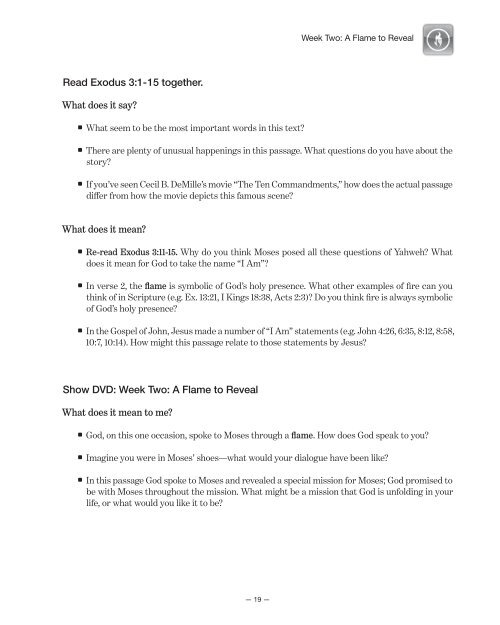2011 Lent Study Guide - University Presbyterian Church
2011 Lent Study Guide - University Presbyterian Church
2011 Lent Study Guide - University Presbyterian Church
You also want an ePaper? Increase the reach of your titles
YUMPU automatically turns print PDFs into web optimized ePapers that Google loves.
Read Exodus 3:1-15 together.<br />
What does it say?<br />
What seem to be the most important words in this text?<br />
— 19 —<br />
Week Two: A Flame to Reveal<br />
There are plenty of unusual happenings in this passage. What questions do you have about the<br />
story?<br />
If you’ve seen Cecil B. DeMille’s movie “The Ten Commandments,” how does the actual passage<br />
differ from how the movie depicts this famous scene?<br />
What does it mean?<br />
Re-read Exodus 3:11-15. Why do you think Moses posed all these questions of Yahweh? What<br />
does it mean for God to take the name “I Am”?<br />
In verse 2, the flame is symbolic of God’s holy presence. What other examples of fire can you<br />
think of in Scripture (e.g. Ex. 13:21, I Kings 18:38, Acts 2:3)? Do you think fire is always symbolic<br />
of God’s holy presence?<br />
In the Gospel of John, Jesus made a number of “I Am” statements (e.g. John 4:26, 6:35, 8:12, 8:58,<br />
10:7, 10:14). How might this passage relate to those statements by Jesus?<br />
Show DVD: Week Two: A Flame to Reveal<br />
What does it mean to me?<br />
God, on this one occasion, spoke to Moses through a flame. How does God speak to you?<br />
Imagine you were in Moses’ shoes—what would your dialogue have been like?<br />
In this passage God spoke to Moses and revealed a special mission for Moses; God promised to<br />
be with Moses throughout the mission. What might be a mission that God is unfolding in your<br />
life, or what would you like it to be?


